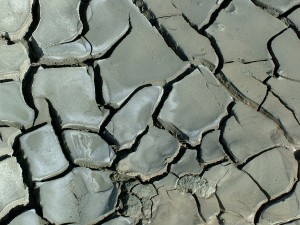 ITHACA, N.Y. – Researchers at Cornell University published a study last week in which they claim that clay helped life spontaneously arise from non-life millions of years ago.
ITHACA, N.Y. – Researchers at Cornell University published a study last week in which they claim that clay helped life spontaneously arise from non-life millions of years ago.
On Thursday, scientists affiliated with Cornell University released a statement detailing new research findings regarding the initial development of life—also known as abiogenesis. In the statement, the researchers suggest clay was a key ingredient when—according to the university—life spontaneously emerged from non-life in earth’s early years.
“We propose that in early geological history clay hydrogel provided a confinement function for biomolecules and biochemical reactions,” said Dan Luo, a professor at Cornell.
The statement from Cornell further suggests that, “over billions of years,” clay could have “confined and protected” certain chemical processes, much like cell membranes do today. Then, the protected chemicals “could have carried out the complex reactions that formed proteins, DNA and eventually all the machinery that makes a living cell work.”
A 14-page scientific report explains the Cornell researchers’ findings in more technical terms:
“Here we mimic the confinement function of cells by creating a hydrogel made from geological clay minerals, which provides an efficient confinement environment for biomolecules,” the report explains. “[O]ur results support the importance of localized concentration and protection of biomolecules in early life evolution, and also implicate a clay hydrogel environment for biochemical reactions during early life evolution.”
According to the report, clay may have protected the very first life forms as they formed and developed.
For evolutionists, life’s origin is a difficult topic, since—despite countless attempts—abiogenesis has never been replicated; nor has it been observed in nature. Thus, many scientists speculate that life somehow arose in a primordial ocean, perhaps due to input from lightning or a volcanic vent.
However, other scientists reject the theory of naturalistic abiogenesis. Dr. Kevin Anderson is a microbiologist with a Ph.D. in microbiology and many years of research experience. He told Christian News Network that last week’s Cornell report does not realistically portray any type of leap from non-life to life. Rather, it vaguely suggests that abiogenesis is possible and proven, without citing tangible evidence.
“This type of ‘hand wave’ is common—act like everything is all figured out—and is frequently done so as to avoid having to actually acknowledge that abiogenesis has no evidence,” Anderson stated. “Thus, with a ‘hand wave’ [evolutionists] can pretend there are just a few minor points to address, and rationalize that there is no need to answer creationists’ challenges.”
“However,” Anderson continued, “creationists have long scoffed at such a hand wave, pointing out that even under almost pristine conditions, evolutionists’ experiments rarely achieve anything but a D & L mixture of a few amino acids or a few bits of other organic molecules (and often ignore many other very toxic molecules, such as formate, that are also formed during the process).”
In terms of the Cornell scientists’ findings, Anderson says they concluded that clay (or some type of gel) would be necessary to protect early biomolecules, but never explain how those living molecules formed in the first place. Ultimately, Anderson told Christian News Network, the idea that life spontaneously appeared without a Creator takes an enormous leap of faith.
“The immense speculation, and lack of any significant evidence or mechanisms for abiogenesis strongly support the creationists’ claims that abiogenesis is really nothing more than ‘wishful thinking’ on the part of the materialists,” he concluded. “In fact, the more the problem is studied, the more difficulties arise. Adding to the problem for materialists, the more we understand about cells and living systems the greater the gulf becomes between life and non-life. Thus, the final conclusion is that there is not a shred of evidence that life can form spontaneously under any conditions.”
Become a Christian News Network Supporter...


